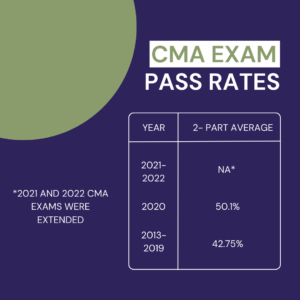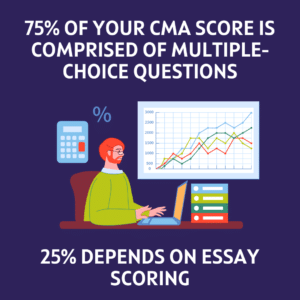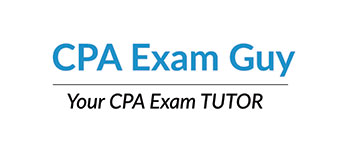Thinking of cramming for your Certified Management Accountant (CMA) exam? Think again.
CMA Pass rates are historically low.
Even with rigorous preparation, a genuine interest in accounting, and an aptitude for the job, the CMA exam results and pass rates suggest that you’re about as likely to pass on your first try as you are to toss heads in a coin flip.
Sorry to break it to you, but no amount of energy drink-fueled all-nighters will prepare you for the test. Instead, you should focus on learning everything you can about your chances to pass and what actions you can take to tip the scales in your favor.
Even though passing the CMA exam can be tricky, it’s totally doable. However, in order to conquer it, you need to be well informed about what you’re dealing with first.
Let’s take a look at CMA pass rates over the last few years. Then, we’ll explore a few ways that you can increase your chances of earning a passing score.
CMA Passing Rate Compared to Other Accounting Certification Exams
 You might be surprised the learn that when compared to other accounting certification exams, the CMA pass rates are among the lowest, coming in at around 50%. The Certified Public Accountant (CPA) exam is similar, with a 54% pass rate.
You might be surprised the learn that when compared to other accounting certification exams, the CMA pass rates are among the lowest, coming in at around 50%. The Certified Public Accountant (CPA) exam is similar, with a 54% pass rate.
Many CMA candidates looking for a CMA exam passing score are shocked to learn that so many candidates fail on the first try. They’re also equally as shocked to learn that the CMA is one of the hardest accounting exam offerings.
The good news is that the CMA exam isn’t the most difficult one to pass. This award actually goes to the CFA. The Certified Financial Analyst (CFA) exam has a pass rate of just 36%. Conversely, there are easier options out there, considering the Enrolled Agent (EA) exam boasts an impressive pass rate of 74%.
If there’s one thing that rings true in the world of accounting certification exams, it’s this: they’re not easy. After all, the financial management concepts you’ll need to understand in order to pass them are complicated, and 100% accuracy is vital to ensuring the clients you’ll work for have accurate financial documents.
This is why so many of the CMA exam passing candidates have done these things: researched CMA passing percentages, identified a targeted minimum passing score, enrolled in a CMA course for exam preparations, or even hired a CMA coach.
Of course, it’s preferable that you do these things before wasting money on an exam window.
The good news is that even if you don’t pass the CMA exam on your first attempt, you do have a chance to redeem yourself. Even though you can only attempt the test one time per testing window, there are three testing windows per year, giving you three attempts to pass annually.
CMA Exam Pass Rates before the 2020 CMA Exam Changes
Prior to the changes to the CMA exam in 2020, CMA pass rates were well under the 50% rate we see today. Since the content specification outline was missing key details needed for test takers to adequately prepare, it was difficult to know what to study.
For this reason, the pass rate for Part 1 of the CMA exam remained around 35% for several years leading up to 2020. The part 2 pass rate was 45%, which remains the same today.
2020 and 2021 CMA Exam Pass Rates

In 2020, the Institute of Certified Management Accountants (ICMA) revised the CMA exam content specification outline, which resulted in higher pass rates for many candidates. This revised document includes a more detailed look at what the CMA exam covers.
The most considerable changes were made to the curriculum relating to Part 1 of the CMA exam. In short, the ICMA added new content covering analytics and technology. There were also some minor changes applied to the curriculum for Part 2 that placed a stronger emphasis on ethics and decision-making.
Thanks to these revisions, the CMA exam part one passing percentages saw an impressive increase. Prior to these changes, pass rates for Part 1 remained consistently around 35%. After implementing the changes, the ICMA announced a pass rate of 45% for both sections.
Still, the number of candidates passed is less than half. So while many CMA scores are rising, less prepared candidates still fail, just like in previous years.
Understanding CMA Pass Rates
There’s no doubt that it can be intimidating to consider CMA pass rates. After all, based on the numbers, it looks like you’re about as likely to pass as you are to fail. However, it’s important to remember that there are many factors that could contribute to this number.
Firstly, did you know that you don’t have to have a bachelor’s degree to attempt the CMA exam? It’s true! Even though you need your diploma to get a CMA certification, there’s no requirement to do so to take the test. That means at least a portion of those who fail the exam probably haven’t even finished college yet.
It’s also not required that test takers have any accounting experience before testing. Since real-world experience fosters a deeper understanding of test objectives, that could also contribute to the split.
Finally, since a portion of the test requires hand-written answers, test takers who don’t speak English as a first language could struggle to score well in these areas. Since the overall CMA core is a cumulative one based on weighted scores on each part, not scoring well on the essay section can have a seriously negative impact on the overall score. This is why those in non English speaking regions, Chinese candidates (and Asian candidates as a whole) often opt for extra prep time.
To recap: even though you may not be required to finish school or gain some real-world knowledge before your test, these things are extremely helpful in helping you pass on your first attempt.
Ways to Increase Your CMA Exam Pass Rate
You don’t have to be among the failing CMA exam pass rates. With a little help, you can ensure that you pass the CMA exam on your first attempt.
How is this done?
Perhaps the best way to increase your CMA exam pass rate is to adequately prepare for the test. That means you’ll need to spend plenty of time studying and gaining real-world knowledge about important topics like strategic financial management, financial planning, and professional ethics.
CMA review courses are designed specifically to help hopeful management accountants prepare for the exam. With the right exam course, you can gain resources like practice tests, video lessons, and even live one-on-one instruction. These resources can greatly improve your chances of passing the CMA exam on your first try.
It’s equally important to be strategic when studying for your CMA exam. It’s tempting to focus on memorizing information; however, committing information to memory won’t greatly increase your chances of passing. Instead, place emphasis on absorbing important information and focus on how to apply that knowledge in real-world scenarios.
How is The CMA Exam Graded?

There isn’t an exact passing percentage because each version of the test varies with difficulty. A really hard CMA exam may require you to score a 70% to pass. An easier version of the exam may only expect 65%. The exact numbers are not released by the Institute of Management Accountants.
What we do know is that the CMA exam is graded positively. This means there are no penalties for giving the answer wrong. That means that you should make an effort to answer every question on the test, even multiple choice questions, even if you’re not sure whether your response is the correct answer. However, answering at least half of the multiple choice questions correctly is required to attempt the essay questions.
Here’s the breakdown of how the CMA score is calculated and how your numbers are crunched:
75% of your grade is comprised of multiple-choice questions, and essays make up 25% of your grade.
How Long Does It Take to Study to Pass the CMA Exam?
In order to increase your chances of passing the CMA exam on your first attempt, you need a dedicated study plan. Having a plan of action empowers you to use your allotted time wisely and can decrease the amount of time it takes you to earn a CMA certification.
According to the Institute of Management Accountants (IMA), you’ll need to complete at least 170 study hours to pass Part 1 of the exam and a minimum of 130 hours for Part 2. According to the IMA’s recommendations, you can complete the recommended study hours in about 10-13 weeks for exam part of 1 and 8-11 weeks for Part 2.
If you already have a plan for when you want to take the CMA exam, it’s a good rule of thumb to create a study plan. This plan sets you up for success by ensuring you have the time you need to realistically reach your goals.
You’ll need to consider a few factors, such as how much free time you have, what your learning style is, and how familiar you are with the topics on the exam, to create the best study plan for you. Then, you can better select the study materials you’ll need to succeed.
CMA Pass Rates FAQ
A: Many CMA candidates ask this question: “How hard is the CMA exam?” Pass rates show that only around half of those who sit in a certain exam window actually earn a passing score. The CMA is a tough test, and this is why the CMA exam pass rate is so low.
When compared to other accounting exams, the CMA exam is among the most difficult to pass, based on pass rates. With a 50% pass rate, it’s surpassed only by the Chief Financial Analyst (CFA) exam, which has a pass rate of just 35%.
A: The most recently published CMA pass rate is 50% for both parts. However, pass rates are not released in real time, so these numbers can fluctuate. IMA lets candidates prepare ahead of time using a CMA program or CMA review course.
A: When considering pass rates as the metric to compare the difficulty of the CMA exam versus the CPA exam, the CMA is slightly harder. For context, the most recently released CMA pass rate is 50%, while the CPA currently sits at 54%.
A: CMA candidates are required to need an undergraduate degree. You also need at least two years of professional experience in management accounting or financial management. Other eligibility requirements are outlined by the Institute of Management Accountants (IMA).
A: No. The CPA and CMA exams are two different tests that lead to different certifications. CPA exam candidates must pass a four-part test. The CMA exam consists of two parts. To pass the CMA exam, CMA candidates must pass both. There are review courses that reveal exam secrets, increase cognitive skills, and increase the likelihood of a CMA exam passing score.
Sources:
